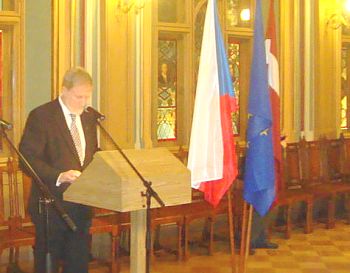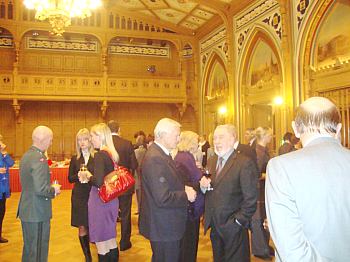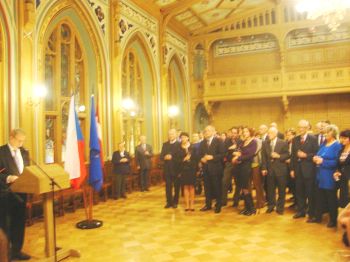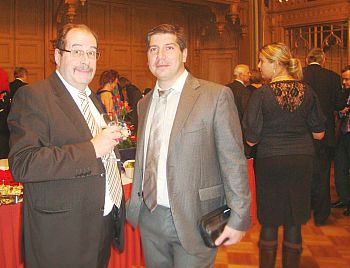Czech Embassy reception

On October 28 in Riga Small Guild Hall the Czech Embassy reception was held on the occasion of the Independent Czechoslovak State Day.
In 1918 the National Committee of the Czech Republic proclaimed the independence from the Austro-Hungarian Empire and the unification of Czech and Slovakia into Czechoslovak Republic was declared.
The dissolution of Czechoslovakia, which took effect on 1 January 1993, was an event that saw the self-determined separation of the federal state of Czechoslovakia . But 28th of October, Czechoslovak Republic foundation Day, is one of the most important holiday’s of the Czech Republic till now.
The Ambassador of the Czech Republic Mr. Tomáš Pštross :
«Exactly one year ago, in this place and in the very same context I expressed my conviction that the next national holiday of the Czech Republic would take place in Latvia in a better overall mood, in which the much improved ability of both our countries to overcome the consequences of the global financial and economic crisis would be positively reflected. Developments in the past few months have confirmed these hopes, and I am pleased that, regardless of the many obstacles we have yet to surmount, we can gladly accept this fact.
The Czech Republic, too, was forced to undertake a number of economic and political measures that imposed many restrictions on the public and can be viewed as a step back from the perspective of gradual approaching the level of developed democratic countries in the past 20 years. This process is far from over, but there is no other way, since macroeconomic indicators – mainly the systematic increase of budget deficit – clearly alerted us that we have started living at the expense of future generations and that somebody will have to pay dearly for our current well-being in the future.
We know that, in Latvia, your experience with overcoming the crisis has been considerably more dramatic, and the sacrifices you bear and that you have yet to bear are incomparably greater. Yet the resolve with which you are handling it all deserves credit, and in its own way it serves as a model for all the countries in a similar position. I am happy that this was acknowledged by the Czech President, Václav Klaus, during his visit to your country this year. Obviously, this augmented the interest in your recent parliamentary election by the Czech public, because it could view the outcome as a promising prerequisite for stable political development of your country in the future.
I am intentionally referring to the overcoming of the crisis as a current example of similarities between both our countries. Such similarities have their own, historically determined causes; therefore, the experience that brings us closer together is also similar. Of course, it does not overlap completely, yet it includes a whole series of instances where our countries, despite a certain geographical distance, were very well aware of each other and drew mutual inspiration. As an example, I could mention the resonance caused here in Latvia by our tragically curtailed attempt at liberalising the communist system in the late 60s, and the tremendous wave of sympathy and solidarity that we saw at the time of the final collapse of the very same system in all three Baltic countries at the beginning of the 1990s.
If we speak of the relations between our countries, we cannot overlook the area of economic contacts. Here, the echoes of the economic crisis have manifested most severely. At the turn of 2009 and 2010, mutual trade year-on-year declined by one half of the previous volume. It is only recently that signs of improvement are appearing. In the seven months of 2010, the level reached is 80% of the same period in 2009. I believe that Czech trading activity in Latvia will expand again, that some of our major economic subjects will succeed in obtaining significant contracts for investment in your infrastructure, and that Latvian exporters as well will increase their as of yet fairly negligible representation within the Czech market. Similar opportunities are certainly offered by the service sector, including the prospective field of tourism and travel industry. Further development of mutual commercial exchange will definitely also be facilitated by the new contacts created among businesspeople when our President visited your country in May, as well as when a delegation of Latvian entrepreneurs accompanied your President on his return visit to Prague this August.
I believe that Czech trading activity in Latvia will expand again, that some of our major economic subjects will succeed in obtaining significant contracts for investment in your infrastructure, and that Latvian exporters as well will increase their as of yet fairly negligible representation within the Czech market. Similar opportunities are certainly offered by the service sector, including the prospective field of tourism and travel industry. Further development of mutual commercial exchange will definitely also be facilitated by the new contacts created among businesspeople when our President visited your country in May, as well as when a delegation of Latvian entrepreneurs accompanied your President on his return visit to Prague this August.
As I already mentioned, from the point of view of Czech–Latvian relations, this year has been exceptionally significant: our highest-ranking officials exchanged visits. Relations are developing with great promise at other levels, including the parliaments of both countries; also, cooperation is taking place within the structures of the European Union and as part of NATO. An element of this cooperation is also the mutual support for our national candidates running for European Union institutions: we were unequivocal in our support for Latvia to become the seat of BEREC, the Office of the Body of European Regulators of Electronic Communications.  The representation of our culture in your country also has its own traditions. Despite various economic hurdles, there is also continued cooperation on the academic level, for instance, the instruction of our languages at universities of both countries. New opportunities at regional level are also opening up: for example, a cooperation agreement was signed this year between the Bauska municipality and the district of Náchod in eastern Czech Republic. We are striving to ensure that such forms of mutual relations include young, intellectually curious and talented school-aged people as much as possible. In some cases the results are surprising: a children’s art competition, whose theme was originally dedicated to the Czech village of Lidice, torched by the Nazis during World War II, had more than 2,000 Latvian schoolchildren as entrants from every corner of the country. Many of these activities, within our objectively limited capacity, are organised by our Embassy. We try to spread knowledge about our country, not just here in the capital but also in the more remote corners of Latvia: last year alone, we visited more than 20 locations in the regions of your country with various travelling exhibitions that bring information about our culture and history. By doing so, we realise how hospitable and cordial the residents of these places are, and we were surprised by their interest in all aspects of Czech culture. We will be delighted to continue doing this in the future. I know that we have things to offer in the field of culture. Notably, first and foremost is the musical field. Our artists who come here can appreciate the maturity of the Latvian audiences. I am always pleased to know that the presence of Czech Republic in your country does not possess a material quality alone – in the shape of new Czech trams in your streets, for instance – but that it has a spiritual content as well, which, for example, manifests itself in the renewed Gothic mural paintings in the Riga Dome Cathedral, or in the wonderfully renovated Bauska Castle – both of these have been accomplished by Czech architects and restorers.
The representation of our culture in your country also has its own traditions. Despite various economic hurdles, there is also continued cooperation on the academic level, for instance, the instruction of our languages at universities of both countries. New opportunities at regional level are also opening up: for example, a cooperation agreement was signed this year between the Bauska municipality and the district of Náchod in eastern Czech Republic. We are striving to ensure that such forms of mutual relations include young, intellectually curious and talented school-aged people as much as possible. In some cases the results are surprising: a children’s art competition, whose theme was originally dedicated to the Czech village of Lidice, torched by the Nazis during World War II, had more than 2,000 Latvian schoolchildren as entrants from every corner of the country. Many of these activities, within our objectively limited capacity, are organised by our Embassy. We try to spread knowledge about our country, not just here in the capital but also in the more remote corners of Latvia: last year alone, we visited more than 20 locations in the regions of your country with various travelling exhibitions that bring information about our culture and history. By doing so, we realise how hospitable and cordial the residents of these places are, and we were surprised by their interest in all aspects of Czech culture. We will be delighted to continue doing this in the future. I know that we have things to offer in the field of culture. Notably, first and foremost is the musical field. Our artists who come here can appreciate the maturity of the Latvian audiences. I am always pleased to know that the presence of Czech Republic in your country does not possess a material quality alone – in the shape of new Czech trams in your streets, for instance – but that it has a spiritual content as well, which, for example, manifests itself in the renewed Gothic mural paintings in the Riga Dome Cathedral, or in the wonderfully renovated Bauska Castle – both of these have been accomplished by Czech architects and restorers.
I am delighted that, on a day on which we commemorate the emergence of the first democratic state formation in Czech territory, I was able to cite so many positive examples of cooperation between the Czech Republic and Latvia. Allow me to express hope that this cooperation, which can be based on an identical system of values and equal guarantees for the secure future development of both countries, will continue to deepen.»

Urs Buhler
— Counselor, Embassy of Switzerland and Evangelos Klimis — Consul, Embassy of Greece
 Appeal to world leaders and humanity
Appeal to world leaders and humanity

